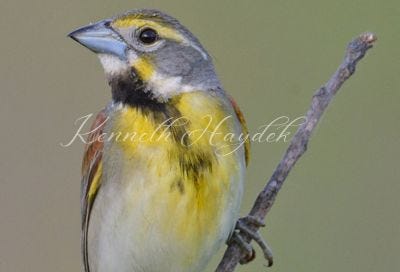November: The Dickcissel
Last month, we searched high and low (mostly low) for the grasshopper sparrow, who is most often identified by song rather than by sight because it is so well camouflaged in its habitat. This month, we are searching out another bird who often nests close to the ground but who has a much more extroverted side, famous for belting out a song that sounds much like its name: the dickcissel.
The dickcissel is a song bird, about the size of a sparrow, 5.5 to 6 inches long. Although it is clumped into the cardinal family, there are not any other birds quite like it, so it really is in a genus all its own (genus “Spiza”—if you want to do some further digging into the subject!).
The name “dickcissel” is from onomatopoeia—the naming of something to suggest its sound, like chirp, buzz, hiss, ding-dong, bang, etc. Birds are sometimes given onomatopoeic names that reflect their songs, such as whip-poor-will (listen) or chickadee (listen). Such is also the case with the dickcissel; it has been named for the way its song sounds. What do you think? Does “dickcissel” sound like this or this?
You will most likely hear this song when dickcissels are perched on a low-lying twig or fence post. Otherwise, you may hear them make a buzzing call sound while flying overhead, typically in choir-fashion, with many hundreds or even thousands of voices chiming in, as dickcissels migrate in large flocks to their winter habitats or summer breeding grounds.
During breeding season, dickcissels inhabit grasslands up and down the center portion of the United States. When fall comes, these extroverts join already-migrating flocks of dickcissels, which increase size the further along they go. Dickcissels winter in Mexico, Central America, and northern regions of South America, especially Venezuela.
Although dickcissels are ground-foraging omnivores—and will munch on bugs such as spiders, caterpillars, grasshoppers, and termites as readily as they will eat seeds and grains—their diet in the winter months is mainly granivorous (that is, grain-eating, and they can really pack it away, too, with the ability to shell and eat 12 or more sorghum seeds per minute). This characteristic can be a challenge for farmers, who may see flocks of literally millions of birds hang out on their croplands in the fall and winter months. Farmers have devised different methods to shoo away dickcissels, and some have even resorted to killing them with chemical sprays.
Both male and female dickcissels have a distinctive yellow feather eyebrow stripe, short tails, and beefy bills. They have mottled brown and black feathers on their back, sides, and wings, with creamy white underbellies and grayish brown heads. Breeding males sport something like a V-neck vest: with a sharp black V spot at the neck followed by bright yellow feathers on the chest. Females also have bright yellow chests, but lack the striking black V at the throat. Juvenile dickcissels have paler yellow feathers and no V-neck, regardless of sex.
Dickcissels are polygynous, meaning that males may mate (but don’t always) with more than one female; in fact, males may mate with as many as three females during a breeding season. Males fiercely defend their territories and will only mate with an additional female in the same territory once the first female mate has begun nesting. While the males defend and protect, the females build thick cup-like nests of grasses near or on the ground (though sometimes in short trees if available) and tend to their broods.
Dickcissels have been described as “irregular,” “erratic,” “wandering,” and “nomadic” because of their tendency to turn up in different locations every summer and winter—unannounced and unexpected and in unpredictable quantities. So, if you haven’t yet had the unanticipated joy of seeing dickcissels in grassy areas near you, well … next year, you just might.
Sources:
https://www.allaboutbirds.org/guide/Dickcissel/overview
https://www.audubon.org/field-guide/bird/dickcissel
https://abcbirds.org/bird/dickcissel/
https://a-z-animals.com/animals/dickcissel/
BBN S7:E21 Disappearing Birds, Feeling 'Under the Weather', No-dig Gardening, Dickcissel



